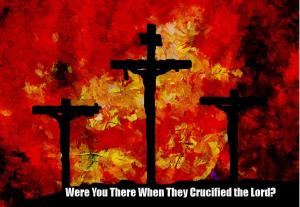To all regular Mass attendees, the reading for Palm Sunday (the Passion narrative) represents the longest Gospel reading of the year (and the shortest homily). This year’s reading comes from Matthew 26:14—27:66. As my family sat and listened to this reading, the singer interspersed verses from the hymn Were You There. The Passion narrative combined with this hymn produced many thoughts on who I was in the Passion of the Lord. Was I the betrayer? Was I the denier? How about the one blinded by political power? Or the one calling for Jesus’ blood? Maybe I am the guilty one inexplicably set free through the suffering and death of another? In this article, I reflect on the Passion narrative considering modern culture, a culture hostile to the Catholic Church. Where do we fit within this narrative? Where were you when they crucified the Lord?
The Betrayer
One of the Twelve, who was called Judas Iscariot, went to the chief priests and said, “What are you willing to give me if I hand him over to you?” They paid him thirty pieces of silver, and from that time on he looked for an opportunity to hand him over.
Judas Iscariot, one of the Twelve disciples, sold Jesus to His enemies for thirty pieces of silver. He eventually betrayed Jesus with a kiss… the kiss of peace. Why did Judas betray his rabbi and one he saw perform miracles and in whose name Judas also healed and preformed miracles? After seeing such things, why did Judas betray Jesus? Was he disillusioned? Frustrated? We may never know. We do know that whatever the reason, Judas sinned against the Lord and died unrepentant. Judas stands as a warning that even those closest to Jesus can betray Him. Moreover, whether through sin, heterodoxy, or apostacy, we all have the potential to betray Jesus. If we do, Jesus provides forgiveness, so unlike Judas, we can repent and receive correction, forgiveness, and absolution.
The Denier
Peter said to him in reply, “Though all may have their faith in you shaken, mine will never be.” Jesus said to him, “Amen, I say to you, this very night before the cock crows, you will deny me three times.”
“Surely you too are one of them; even your speech gives you away.” At that he began to curse and to swear, “I do not know the man.” And immediately a cock crowed. Then Peter remembered the word that Jesus had spoken: “Before the cock crows you will deny me three times.” He went out and began to weep bitterly.
Peter, the rock of the Church, denied Christ three times, even cursing and swearing in his final denial… Not a good look for the leader of the disciples. How many of us find ourselves boastful of our sincerity of faith and conscience, yet ultimately deny Christ and our faith by that same boastful conscience? How many dissident Catholics appeal to the primacy of conscience to justify their denial of Christ? What about the appeal to Catholic Social Teaching to deny Church teaching regarding human anthropology and sexuality? These represent ways we deny Christ in our modern world. Here, too Jesus offers hope in correction, forgiveness, and absolution. Peter, too, found correction, forgiveness, and absolution.
He said to him the third time, “Simon, son of John, do you love me?” Peter was grieved because he said to him the third time, “Do you love me?” and he said to him, “Lord, you know everything; you know that I love you.” Jesus said to him, “Feed my sheep. (John 21:17)
Blinded by Political Power
They all said, “Let him be crucified!” But he [Pilate] said, “Why? What evil has he done?” They only shouted the louder, “Let him be crucified!” When Pilate saw that he was not succeeding at all, but that a riot was breaking out instead, he took water and washed his hands in the sight of the crowd, saying, “I am innocent of this man’s blood.
Pontius Pilate, like all pollical leaders, fears unrest and disappointing the “crowd.” In our modern world, unrest and disappointment of the “mob” means losing votes and political power. Furthermore, Catholic politicians sacrifice their Catholic faith on the altar of political power in name of conscience and the supposed “common good.” They, like Pilate, attempt to “wash their hands” of innocent unborn blood by claiming this blood’s necessary to protect women’s rights and bodily autonomy. Likewise, they also make a Faustian bargain with well-intentioned Catholic voters who, motivated by compassion, vote for these politicians. The bargain: sacrifice the unborn to help those in need of government assistance. Scandalous.
Calling for Jesus’ Blood
Pilate said to them, “Then what shall I do with Jesus called Christ?” They all said, “Let him be crucified!” But he said, “Why? What evil has he done?” They only shouted the louder, “Let him be crucified!”
After all the good Jesus accomplished during His three-year ministry, why does the crowd turn on Him so violently and call for His blood? Were they paid off? Or were they simply carried away by the emotions of an angry mob? How many of us get caught up in a mob-mentality? We live in a culture where the mob, especially on social media, dictates what we should think, feel, and believe. If we do not comply with the “mob,” we find ourselves canceled. Some of the mob go so far as to commit violence in the name of social justice, as in 2020. When we become part of the crowd demanding blood, we lose sight of the message of the one who shed His blood for us.
The Guilty Set Free Through the Suffering and Death of Another
Now on the occasion of the feast the governor was accustomed to release to the crowd one prisoner whom they wished. And at that time they had a notorious prisoner called Barabbas. So when they had assembled, Pilate said to them, “Which one do you want me to release to you, Barabbas, or Jesus called Christ?”
The governor said to them in reply, “Which of the two do you want me to release to you?” They answered, “Barabbas!”
Then he released Barabbas to them, but after he had Jesus scourged, he handed him over to be crucified.
The injustice of this moment. An innocent man, a healer and teacher, is exchanged for a known violent criminal. Likely, the crowd knew of Barabbas and his crimes, knew of his violent (notorious) record. As a notorious criminal, Barabbas deserved to suffer for his crimes. Conversely, he did not deserve freedom. Likewise, as sinners, we do not deserve eternal life and freely choose to sin and therefore should suffer the consequences of those sins. Like Barabbas, Christ takes our place as a satisfactory sacrifice for all.
615 “For as by one man’s disobedience many were made sinners, so by one man’s obedience many will be made righteous.” By his obedience unto death, Jesus accomplished the substitution of the suffering Servant, who “makes himself an offering for sin”, when “he bore the sin of many”, and who “shall make many to be accounted righteous”, for “he shall bear their iniquities”. Jesus atoned for our faults and made satisfaction for our sins to the Father.
Scripture does not inform us of the fate of Barabbas. Did he eventually come to know the man who took his place? One hopes so.
Where Do We Fit Within This Narrative?
As we conclude Holy Week, let us look at the Passion narrative and examine ourselves in its light. Do we betray Christ by our actions and unfaithfulness to His teaching? Do we deny Christ by holding our own conscience over Christ, as if we know better than Him and the Church He established? Are we blinded by political power and those who manipulate our compassion for the needy while sacrificing the most vulnerable in the womb? Do we follow the “mob” that seeks our obedience and acquiesce, even to the point of supporting violence in the name of so-called social justice?
Or do we find ourselves stunned at the sight of an innocent man taking our place and paying our price? Do we humbly follow this man, this Godman, with our whole body, mind, and soul? I hope that we can say “yes” this Easter.
Thank you!
If you enjoy my writing and want to support my work, please consider donating $1 or any size gift by clicking here. Thank you!
Read my other writing here.
Please click the link below to join.
Voices of the Faithful in the Synod on Synodality
Please make your voice heard.
I Support Church Teaching in the Synod of Synodality














